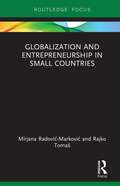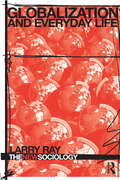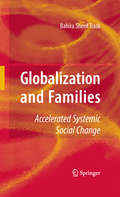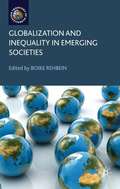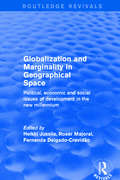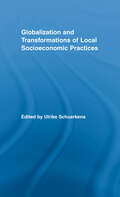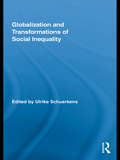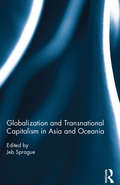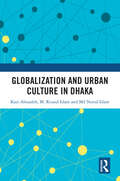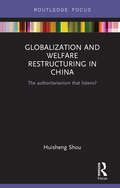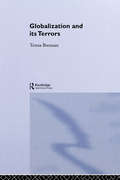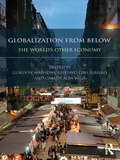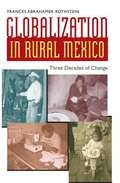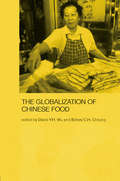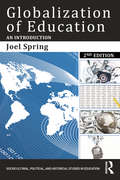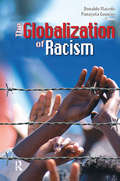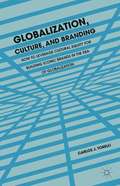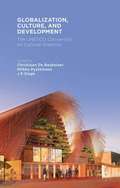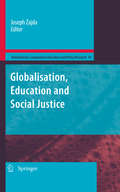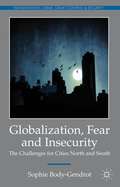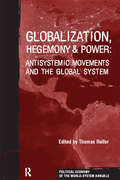- Table View
- List View
Globalization and Entrepreneurship in Small Countries (Routledge Focus on Business and Management)
by Mirjana Radović-Marković Rajko TomašThe changeable business environment requires a new business framework and an understanding of the global market trends and the culture that will impact on business. Globalization and Entrepreneurship in Small Countries considers important business principles and makes them accessible for entrepreneurs and small business owners. It addresses the role of managers and leaders and management techniques in the context of global strategy of companies, as well as the culture diversity that comes with globalization of organizations. To meet the constantly changing conditions and demands, business must transcend boundaries to get what it needs regardless of where it exists – geographically, organizationally, and functionally. This book draws together earlier literature on SME development and internationalization from disparate sources into a cohesive body of work, which traces the evolution of our understanding of the topic. It explores just how globalization affects the demand for business and entrepreneurship, and will therefore be of interest to researchers, academics, policymakers, and students in the fields of entrepreneurship, globalisation, organisational studies, and SMEs development in small countries.
Globalization and European Welfare States: Challenges and Change
by Bruno Palier Robert Sykes Pauline M. Prior<p>This book seeks to counter the recent trend of speculation about the impact of globalization upon welfare states. It begins by asking two related questions: 'What exactly is globalization?' 'How, if at all, has globalization been implicated in recent changes to European welfare states?' <p>The book combines both theoretical and empirical analysis to provide a critical account of the relationship between globalization and change in European welfare states. <p>Firstly the key theoretical and conceptual debates are reviewed and the existing perspectives on globalization and welfare policy change are assessed. The text moves on to explore and challenge the more apocalyptic economic perspectives on globalization and welfare that suggest permanent retrenchment. The discussion includes an outline and assessment of the role of international organisations such as the World Bank and the EU. <p>All the major types of European national welfare system are considered: Bismarkian, Southern, Central and Eastern European, Nordic and Liberal. Individual chapters outline recent welfare policy changes in the European countries of each system, and the role of globalization in such changes. <p>This ground-breaking text provides new empirical and theoretical perspectives on links between globalization and European welfare state change. It will be important reading for students and academics in the fields of social policy, politics, international relations, European studies and related fields.</p>
Globalization and Everyday Life (The New Sociology)
by Larry RayGlobalization and Everyday Life provides an accessible account of globalization by developing two themes in particular. First, globalization is an outcome of structural and cultural processes that manifest in different ways in economy, politics, culture and organizations. So the globalized world is increasingly heterogeneous, unequal and conflictual rather than integrated and ordered. Secondly, globalization is sustained and created by the everyday actions of people and institutions. Both of these have far-reaching consequences for everyday life and are fully explored in this volume. Larry Ray skilfully guides students through the various aspects of the globalization debate and illustrates key arguments with reference to specific topics including nation, state and cosmopolitanism, virtual societies, transnationals and development. This innovative book provides this information in a clear and concise manner suitable for the undergraduate student studying sociology, social geography, globalization and development studies.
Globalization and Families
by Bahira TraskAs our world becomes increasingly interconnected through economic integration, technology, communication, and political transformation, the sphere of the family is a fundamental arena where globalizing processes become realized. For most individuals, family in whatever configuration, still remains the primary arrangement that meets certain social, emotional, and economic needs. It is within families that decisions about work, care, movement, and identity are negotiated, contested, and resolved. Globalization has profound implications for how families assess the choices and challenges that accompany this process. Families are integrated into the global economy through formal and informal work, through production and consumption, and through their relationship with nation-states. Moreover, ever growing communication and information technologies allow families and individuals to have access to others in an unprecedented manner. These relationships are accompanied by new conceptualizations of appropriate lifestyles, identities, and ideologies even among those who may never be able to access them. Despite a general acknowledgement of the complexities and social significance inherent in globalization, most analyses remain top-down, focused on the global economy, corporate strategies, and political streams. This limited perspective on globalization has had profound implications for understanding social life. The impact of globalization on gender ideologies, work-family relationships, conceptualizations of children, youth, and the elderly have been virtually absent in mainstream approaches, creating false impressions that dichotomize globalization as a separate process from the social order. Moreover, most approaches to globalization and social phenomena emphasize the Western experience. These inaccurate assumptions have profound implications for families, and for the globalization process itself. In order to create and implement programs and policies that can harness globalization for the good of mankind, and that could reverse some of the deleterious effects that have affected the world's most vulnerable populations, we need to make the interplay between globalization and families a primary focus.
Globalization and Food Sovereignty
by Jeffrey Ayres Peter Andree Michael Bosia Marie-Josee MassicotteIn recent years, food sovereignty has emerged as a way of contesting corporate control of agricultural markets in pursuit of a more democratic, decentralized food system. The concept unites individuals, communities, civil society organizations, and even states in opposition to globalizing food regimes.This collection examines expressions of food sovereignty ranging from the direct action tactics of La Vía Campesina in Brazil to the consumer activism of the Slow Food movement and the negotiating stances of states from the global South at WTO negotiations. With each case, the contributors explore how claiming food sovereignty allows individuals to challenge the power of global agribusiness and reject neoliberal market economics.With perspectives drawn from Europe, the Americas, Asia, Africa, and Australia, Globalization and Food Sovereignty is the first comparative collection to focus on food sovereignty activism worldwide.
Globalization and Football (Published in association with Theory, Culture & Society)
by Richard Giulianotti Roland RobertsonThis timely book provides an engaging, clear view of the interrelationships within key globalization processes and the international sport of football. Intelligently combining the conceptual and methodological aspects of global studies with the specific cultural conditions of the 'beautiful game' Giulianotti and Robertson illuminate its social history and diffusion, as well as wider cultural, economic, political and social dimensions. Using football to chart an increasing global connectivity, or globality, the authors explore how the game may be understood as a metric, mirror, motor and metaphor of globalization Issues discussed include: - Transnational Identities and the Global Civil Society, - Cosmopolitanism & Americanization, - Neo-Liberalism, Inequalities and Transnational Clubs, - Politics, Nations, and International Governance, Ideal for students and lecturers concerned with the sociology of sport, globalization and international cultural studies - the book will be of interest to anyone keen to map the intricate ways in which transnational processes may impact upon particular domains of social life.
Globalization and Inequality in Emerging Societies
by Boike RehbeinThis volume studies the relation between globalization and inequalities in emerging societies by linking Area and Global Studies, aiming at a new theory of inequality beyond the nation state and beyond Eurocentrism.
Globalization and Marginality in Geographical Space: Political, Economic and Social Issues of Development at the Dawn of New Millennium
by Heikki Jussila, Roser Majoral, Fernando Delgado-CravidãoThis title was first published in 2001. An examination of globalization and marginality in geographical space, it discusses the issue of marginalization and the effects that economic globalization have on marginal and critical regions from the point of view of politics and policies and the shift from economic to social issues of development.
Globalization and Networked Societies: Urban Regional Change in Pacific Asia
by Yue-Man YeungGlobalization, along with globalism, continues its unrelenting and accelerating march as it draws more countries, cities, and people closer into interdependent relationships. Globalization and Networked Societies attempts to tease out some of the salient elements of this process, especially as it has affected urban centers in Pacific Asia over the past twenty years.
Globalization and Transformations of Local Socioeconomic Practices (Routledge Advances in Sociology)
by Ulrike SchuerkensThis innovative volume provides a comprehensive overview of the transformation of socio-economic practices in the global economy. The contributors offer analytical and comparative insights at the world level, with regard to the current socio-economic practices as well as an assessment of the overall economic globalization phenomenon in the global world. Through empirical case studies of different civilizations or cultures that describe situations of intertwining of local socio-economic practices and global economic modernity, this volume assesses the overall situation in the world, looking at the world as an economic system where some countries act as winners, others as losers and some as both winners and losers of economic globalization. This exceptional book will appeal to sociologists, social and cultural anthropologists, and economists interested in development.
Globalization and Transformations of Social Inequality (Routledge Advances in Sociology)
by Ulrike SchuerkensSocial inequality is a worldwide phenomenon. Globalization has exacerbated and alleviated inequality over the past twenty-five years. This volume offers analytical and comparative insights from current case studies of social inequality in more than ten countries within all the major regions of the world. Contributors provide an assessment of the overall social globalization phenomenon in the global world as well as an outlook of transformations of global social inequality in the future. This book will be a timely addition for students and scholars of globalization studies, social inequality, sociology, and cultural and social anthropology.
Globalization and Transnational Capitalism in Asia and Oceania
by Jeb SpragueNews headlines warn of rivalries and competing nations across Asia and the Pacific, even as powerful new cross-border relations form as never before. This book looks behind the Asia-Pacific curtain: at the new forms of social, economic, and political integration taking place through a global capitalism that is rife with contradictions, inequality, and crisis. We are moved beyond traditional conceptualizations of the inter-state system with its nation-state competition as the core organizing principle of world capitalism and the principal institutional framework that shapes the makeup of global social forces. These important studies examine and debate over how there is a growing transnationality of material (economic) relations in the global era, as well as an emerging transnationality of many social and class relations. How does transnational capitalist class fractions, new middle strata, and labor undergird globalization in Asia and Oceania? How have states and institutions become entwined with such processes? This book provides insight into a field of dynamic change.
Globalization and Urban Culture in Dhaka
by M. Rezaul Islam Kazi Abusaleh Md. Nurul IslamThis book examines globalization and urban cultures in Dhaka, the capital of Bangladesh, from a socio-cultural view. It focuses on the evolving nature of urbanity in the city due to globalization and the global flow of information while framing the changing patterns of everyday cultures and practices. The volume explores key linkages and factors in urban transformation: the history and heritage of Old Dhaka; globalization, diverse urban cultures and ethnic spaces; changes in food habits, clothing, health practices and recreation; changing forms of festivals, marriages and religious practices; situation of indigenous people in Old Dhaka; and the role played by NGOs, civil society and the local government. With its rich ethnographic case studies and field-based evidence, it discusses the relations between technology-driven economic activities and increasing cultural homogenization. It traces developments induced by cultural globalization and includes contemporary debates along with comparisons of Asian and global perspectives. This book will be a useful resource for scholars and researchers of urban studies, city studies, urban sociology, social anthropology, cultural anthropology, political sociology, development studies, South Asian studies and cultural studies, and to those interested in Bangladesh.
Globalization and Welfare Restructuring in China: The Authoritarianism That Listens? (Routledge Contemporary China Series)
by Huisheng ShouIn the past few decades, the change in China’s welfare system has been characterised by a balanced distribution of benefits across social sectors and the institutionalization of welfare redistribution. This process has occurred without significant political change that would empower politically disadvantaged groups such as the urban and rural poor. This book questions what has motivated the regime to redistribute welfare benefits through an institutionalized manner whilst its political structure remains largely unchanged. By situating China within the broader context of East Asia and against the backdrop of globalization since the 1980s, this book examines the institutional origin and development of China’s new welfare system. Through doing this, it provides an understanding of the nature of the Chinese state in dealing with its economy and society in a context of global economic integration. A global-local dynamics framework highlights the importance of the interactive relationship between China’s integration into the world economy and its unique geopolitical constraints, which together induce the regime to listen to its subjects and follow a "move to the middle" in welfare restructuring. Offering a novel explanation of the welfare-globalization relations in a non-democratic setting, this book will be of interest to students and scholars of Social Policy, International Political Economy and Chinese Politics.
Globalization and its Terrors
by Teresa BrennanIt has long been realised that the poorer countries of the south have paid for the unstoppable onward rush of globalisation in the exploitation of their natural and human resources. Recent events have made it clear that there may be a price to be paid in the west as well.In this elegant, lucidly argued account, Teresa Brennan argues that the evidence already exists that globalisation has for years been harming not just the poor of the third world but also its alleged beneficiaries in the affluent west. She shows how the speeding-up of contemporary capitalism, in which space is substituted for time, means that neither then environment nor the people who live in it are given the opportunity to regenerate and how this leads directly to pollution-induced, immune-deficient and stress-related disease. In a final chapter she suggests some alternative ways forward through a return to regionally based production and an emphasis on local economies.
Globalization from Below: The World's Other Economy
by Gordon Mathews Gustavo Lins Ribeiro Carlos Alba VegaThis book explores globalization as actually experienced by most of the world’s people, buying goods from street vendors brought by traders moving past borders and across continents under the radar of the law. The dimensions and practices of ‘globalization from below’ are depicted and analyzed in detail by a team of international scholars. Topics covered include the ‘New Silk Road’, African traders in China, street hawking in Calcutta and pirate CDs in Mexico. The chapters provide intimate portrayals of routes, markets and people in locations across the globe and explore theories that can help make sense of these complex and fascinating case studies. Students of globalization, economic anthropology and developing-world economics will find the book invaluable.
Globalization in Rural Mexico: Three Decades of Change
by Frances Abrahamer RothsteinWhen the ever-intensifying global marketplace "modernizes" rural communities, who stands to gain? Can local residents most impacted by changes to their social fabric ever recover or even identify what has been lost?<P><P>Frances Abrahamer Rothstein uses thirty years of sustained anthropological fieldwork in the rural Mexican community of San Cosme Mazatecochco to showcase globalization's complexities and contradictions. <P> Rothstein's lucid work chronicles the changes in production, consumption, and social relations during three distinct periods: the Mexican "miracle," when economic development fueled mobility for a large segment of the population, including San Cosme's worker-peasants; the lost decade of the 1980s, when much of what had been gained was lost; and the recent period of trade liberalization and globalization, considered by many in Mexico and beyond as a panacea and a disaster at the same time.
Globalization of Chinese Food (Anthropology Of Asia Ser.)
by David Y. H. Wu Sidney C. H. CheungDoes Chinese food taste the same in different parts of the world? What has happened to the Chinese diet in mainland China, Taiwan, Hong Kong and Macau? What has affected the foodways of Chinese communities in other Asian countries with large Chinese diasporic communities? What has made Chinese food popular in Australia, Indonesia, the Philippines and Japan? What has brought about the adoption and adaptation of western food and changes in Chinese diets in Hong Kong, Taiwan and Peking? By considering the practice of globalization, this volume of essays by well-known anthropologists from many locales in Asia, describes changes, variations and innovations to Chinese food in many parts of the world, paying particular attention to questions related to how foods are introduced, maintained, localised and reinvented according to changing lifestyles and social tastes. The book reviews and broadens classic social science theories about ethnic and social identity formation through the examination of Chinese food and eating habits in many locations. It reveals surprising changes and provides a powerful testimony to the impact of late twentieth-century globalization.
Globalization of Education: An Introduction (Sociocultural, Political, and Historical Studies in Education)
by Joel SpringContinuing Joel Spring’s reportage and analysis of the intersection of global forces and education, this text offers a comprehensive overview and synthesis of current research, theories, and models related to the topic. Written in his signature clear, narrative style, Spring introduces the processes, institutions, and forces by which schooling has been globalized and examines the impact of these forces on schooling in local contexts. Significant conceptual frameworks are added to this Second Edition, specifically the “economization of education,” “corporatization of education” and the “audit state.” These concepts are embedded in the global educational plans of major organizations such as the World Bank, the Organization for Economic Development and Cooperation (OECD), World Economic Forum, and multinational corporations. Globalization of Education, Second Edition features new and updated information on • The World Bank• OECD and the United Nations• The World Trade Organization and the Global Culture of Higher Education• Corporatization of Global Education• Religious and Indigenous Education Models• The Global Workforce: Migration and the Talent Auction• Globalization and Complex Thought
Globalization of Racism (Series in Critical Narrative)
by Donaldo Macedo Panayota GounariAddressing ethnic cleansing, culture wars, human sufferings, terrorism, immigration, and intensified xenophobia, "The Globalization of Racism" explains why it is vital that we gain a nuanced understanding of how ideology underlies all social, cultural, and political discourse and racist actions. The book looks at recent developments in France, Germany, Greece, Ireland, Israel, Italy, Portugal, Spain and the United States and uses examples from the mass media, popular culture, and politics to address the challenges these and other countries face in their democratic institutions. The eminent authors of this important book show how we can educate for critical citizenry in the ever-increasing multicultural and multiracial world of the twenty-first century. Contributors are: David Theo Goldberg, Loic Wacquant, Edward W. Said, Zygmunt Bauman, Peter Mayo and Carmel Borg, Anna Aluffi Pentini and Walter Lorenz, Peter Gstettner, Georgios Tsiakalos, Franz Hamburger, Julio Vargas, Lena de Botton and Ramon Flecha, Concetta Sirna, Jan Fiola, Joao Paraskeva, Henry A. Giroux. It explores new forms of racism in the era of globalization.
Globalization, Culture, and Branding
by Carlos J. TorelliDrawing from novel theoretical insights in social psychology, cultural psychology, and marketing, Globalization, Culture and Branding provides guidelines for imbuing brands with culturally symbolic meanings that can create deep psychological bonds with multi-cultural consumers.
Globalization, Culture, and Development
by J. P. Singh Christiaan De Beukelaer Miikka Pyykk�nenThis edited collection outlines the accomplishments, shortcomings, and future policy prospects of the 2005 UNESCO Convention on the Protection and Promotion of the Diversity of Cultural Expressions, arguing that the Convention is not broad enough to confront the challenges concerning human rights, sustainability, and cultural diversity as a whole.
Globalization, Education and Social Justice
by Joseph ZajdaGlobalization, Education and Social Justice, which is the tenth volume in the 12-volume book series Globalisation, Comparative Education and Policy Research, presents up-to-date scholarly research on major discourses concerning global trends in education, social justice and policy research. It provides an easily accessible, practical yet scholarly source of information about the international concern in the field of social justice, globalisation, and policy research. Above all, the book offers the latest findings to the critical issues in education and social justice globally. It is a sourcebook of ideas for researchers, practitioners and policy makers in education, globalisation and social justice education reforms around the world. It offers a timely overview of current issues in social justice affecting education policy research in the global culture. It provides directions in education, and policy research, relevant to transformational educational reforms in the 21st century. The book critically examines the overall interplay between globalisation, education reforms, and social justice. It draws upon recent studies in the areas of globalisation, social justice education reforms and the role of the State. It explores conceptual frameworks and methodological approaches applicable in the research covering the State, globalisation, equity, education, and social justice. It demonstrates the neo-liberal ideological imperatives of education and policy reforms, and illustrates the way the relationship between the State and education policy affects current models and trends in education reforms for social justice and schooling globally. Various book chapters critique the dominant discourses and debates pertaining to the politics of social justice and education globally and the newly constructed and re-invented models of neo-liberal ideology in education and policy reforms. Using a number of diverse paradigms in comparative education research, ranging from critical theory to post-structuralist discourses, the authors, by focusing on globalisation, social justice and democracy, attempt to examine critically both the reasons and outcomes of education reforms and policy change for social justice. The volume offers a more informed critique on the Western-driven models of education reforms and implications for social justice. The book also draws upon recent studies in the areas of equity, cultural capital and dominant ideologies in education. The general intention is to make Globalization, Education and Social Justice available to a broad spectrum of users among policy-makers, academics, graduate students, education policy researchers, administrators, and practitioners in the education and related professions.
Globalization, Fear and Insecurity
by Sophie Body-GendrotFear is ingrained in the history of cities but our short-sightedness prevents us from grasping its evolution over time. Increasingly, risk and fear are experienced, portrayed and discussed as globalized phenomena, particularly since 9/11. This research puts urban insecurity in perspective, with a comparison of world cities in the North and South.
Globalization, Hegemony and Power: Antisystemic Movements and the Global System (Political Economy of the World-System Annuals)
by Thomas ReiferThis book explores the closely related dynamics of globalization, hegemony and resistance movements in the modern world. Complimented by dramatic explorations of the new trans-border resistance movements, from the contemporary labor movement to the resurgence of nationalism, this book moves beyond the traditional focus on cycles of rise and decline of great powers to asses the pressing questions at the intersection of contemporary globalizations and hegemonic rise, decline and resurgence of civilizations. Moreover, the book provides a compelling analysis of the role of contemporary globalization in the resurgence of Islamic activism across the globe and the challenges this poses for traditional theories of modernity and global social movements. Contributors: Immanuel Wallerstein, Joachim Rennstich, William Robinson, Jeffrey Kentor, AMy Holmes, Kathleen Schwartzman, Edna Bonacich, Terry Boswell, Paul M. Lubeck & Thomas Reifer, Lauren Langman & Douglas Morris.
